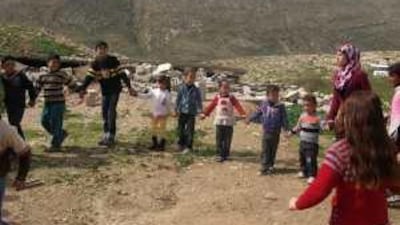KHIRBET TANA, WEST BANK // When the ripples of children's laughter and singing ring out across this remote community nestled in the gentle valleys of the rocky West Bank hills, it seems like all is well at Khirbet Tana. Yet this simple, agricultural community of around 250 people is being paid a visit by a Unicef psychosocial support team. Mothers sit with toddlers and babies under the guidance of one team of social workers, while another is encouraging a group of young children to sing, play games and draw pictures nearby. Around them are the remains of some of the homes that were recently demolished by the Israeli military - an experience that has, not surprisingly, left this community in shock.
In December last year, Israeli forces demolished 16 homes and several other structures, including a school, at Khirbet Tana - which left 100 people, including 34 children, homeless. The community lives in "Area C" of the occupied West Bank, which means that Israel has full military and administrative control. Building permits have not been granted to the residents of Khirbet Tana since the 1980s. Their land is defined by Israel as a closed military zone; the community's basic shacks and buildings are thus deemed "illegal" and destroyed.
This is not the first time that demolitions have taken place here: in 2005 the Israeli military destroyed 28 buildings, making 20 families homeless. For children, the experience of seeing their home destroyed can have far-reaching consequences. "They are scared and have nightmares," says Iman Tarter, one of the social workers at the psychosocial support project in Khirbet Tana, run through Unicef and the YMCA.
The project is in its first weeks, and helps children between nine and 13 years old. "They are bed-wetting and they become very aggressive, or withdrawn, or have difficulties speaking," said Ms Tarter. Initially, social workers focus on developing trust. "It is not easy for children to go into the details of their worries and upsets until we build some connection with them," explains Ms Tarter. "So first we build relations so that they feel they can open up in later sessions."
Later, the group will start to employ techniques such as expressive therapy or tested trauma-management methods to help these children, who have already been assessed as suffering from anxiety, stress and fear. "I have been three times and I like the games and the drawings," said nine-year-old Ahmad of the weekly sessions, holding up his picture of crayoned houses and trees. "When we come here we forget what we have been through, at least temporarily," said Bra'a, 10, whose home was one of those demolished last month. "I sing with the group and I forget my sadness."
Khirbet Tana is one of countless Palestinian communities caught up in a dense system of Israeli laws governing "Area C" - a designation from the Oslo Accords of the early 1990s. Comprising around 60 per cent of the West Bank - most of it rich agricultural land - this area is home to around 70,000 Palestinians. But it is also where most of an estimated 200 Israeli settlements - defined as illegal according to international law - are located. Some 300,000 Jewish settlers reside in this area. And while the international community tried to persuade Israeli and Palestinian leaders to resume political negotiations, these settlements remain a sticking point. Israel, responding to US pressure, announced a partial, conditional 10-month settlement freeze last November - but reports in the Israeli press have signalled that building has continued apace. Akiva Eldar, chief political columnist for Israel's Haaretz newspaper, wrote that "only an idiot" would conclude Israel had frozen settlement activity.
In 2008, the Israeli settlement monitoring group Peace Now found that 94 per cent of all Palestinian planning permits in Area C were refused during a period of seven years since 2000. According to an OCHA report late last year, Palestinians are almost entirely prevented from building in Area C. Meanwhile, some 39 per cent of the West Bank is run by Israeli settlement councils, even though this land represents around 40 per cent more than is actually populated by settlers. Peace Now has said that the effect is a "silent transfer" of Palestinians, out of Area C and into the smaller, Palestinian-authority controlled parts of the West Bank: enclaves.
Palestinians living in Area C are subject to upheaval: military checkpoints, curfews, land confiscations and house demolitions. Last month, an OCHA report highlighted the vulnerability of other Palestinians in Area C: three other communities living in what Israel defines as "closed military zones" received eviction order last month, putting dozens of people under risk of being made homeless. Last year, nearly 200 building were demolished in parts of the West Bank defined as "closed military zones".
In Khirbet Tana, the community is just starting to get over the trauma of house demolitions - and many of the families are now living in tents. "This is our land, whatever the Israelis do," said 10-year-old Bra'a, one of those made homeless last month, as she carefully holds onto her Unicef colouring book and crayons. "I'm going to draw the houses, trees, the sun, the water springs. God willing, nothing like that will happen to us again."
foreign.desk@thenational.ae

